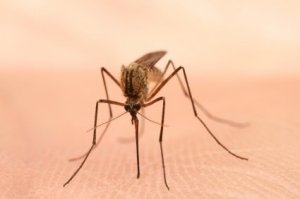What is this gardener’s bane? Worse than weeds, the mosquito can damage my garden by keeping me out of it! There are some 63 species of mosquitoes living here in New Jersey. Some will travel just a few yards for a meal, others can fly as far as 50 miles. The potential for contracting St. Louis Encephalitis, Eastern Equine Encephalitis or West Nile Virus through a mosquito bite makes them more than a simple pest.
For the big picture on what is being done state-wide, visit http://www.nj.gov/dep/mosquito/index.html which has many resources. For those of you with larger properties or properties that include wetlands, this is a particularly useful site.
Go local at http://www.morriscountynj.gov/mosquito/ to learn what the Morris County Mosquito Commission is doing to keep this pest under control. There are many steps you as a homeowner can take to help control mosquito populations.
Plants as well can help repel mosquitoes. Get some suggestions at http://eartheasy.com, search mosquito repelling plants. The students at Alderleaf Wilderness College have lots of experience with this topic – study their plant list at www.wildernesscollege.com, search “plants that repel mosquitoes” and click on the link to the Science Daily study that is published here.
It’s the female mosquito who does the biting and she is attracted to the CO2 we are emitting. Here is a simple and inexpensive way to attract mosquitoes, ostensibly to an area in which you are not: http://www.thriftyfun.com/tf22399231.tip.html
It’s not only that more kinds of mosquitoes living in New Jersey, but also that the animals that eat mosquitoes are declining. At www.motherearthnews.com, search “bats” where we learn that “Much of the blame for declining bat populations rests on human shoulders. Bats can be poisoned when they consume insects that have been sprayed with synthetic pesticides. But the biggest problem for bats, is the loss of natural habitat. Many bats prefer to roost in dead or dying trees under the loose and peeling bark, or in tree cavities. Some prefer to roost in caves or caverns. Populations have dwindled and diversity has suffered without the protection of these important natural roosts.”
Learn more about the bat, which can eat about 1000 mosquitoes a day (or night) at Bat Conservation International (www.batcon.org). You may consider installing a few bat houses in your garden to help with the mosquito problem.
Finally – how can plants help you once you’ve been bitten? Many people are familiar with the anti-itch properties of tea tree oil, and stinging nettles. Here is an interesting site that features an ointment made of the plantain leaf – http://www.5orangepotatoes.com/blog/2009/09/01/plantain-insect-sting-and-bite-remedy/.
Wishing you a mosquito-free summer in your garden! by Lesley Parness – lparness@morrisparks.net
